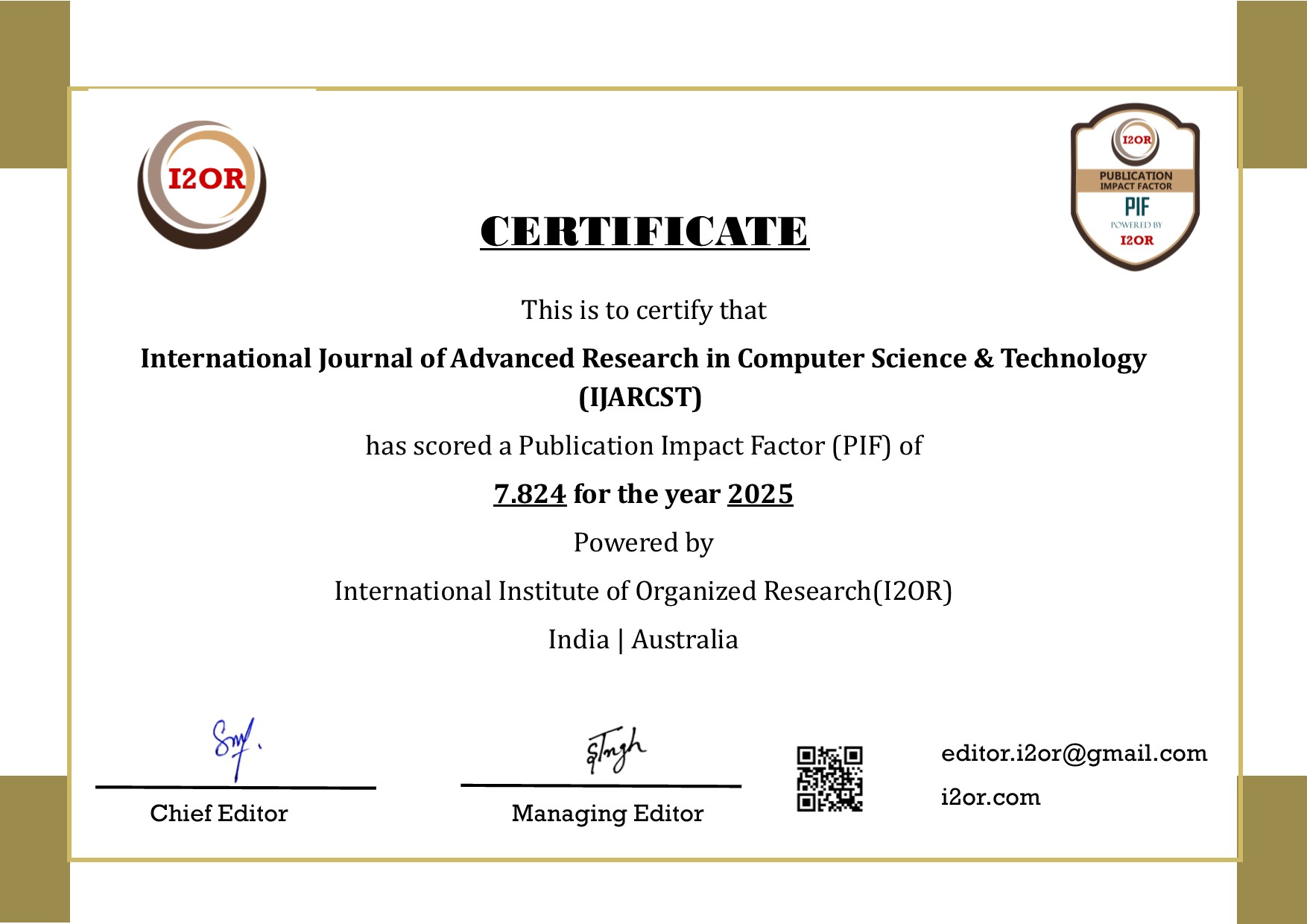AI-Driven Reliability in Cloud and Power Systems: From Software Maintenance to Privacy-Aware Safety Redundancy
DOI:
https://doi.org/10.15662/IJARCST.2022.0504003Keywords:
AI-driven reliability, predictive maintenance, event classification, safety redundancy, cloud computing, power systems, privacy preservation, machine learning, NLP, cybersecurity, fault detection, reliability engineeringAbstract
The integration of Artificial Intelligence (AI) into cloud and power systems is revolutionizing how reliability, maintenance, and safety are achieved. This study explores an AI-driven framework designed to enhance system reliability through predictive software maintenance, intelligent event classification, and privacy-aware redundancy management. By leveraging machine learning models and natural language processing (NLP) techniques, the proposed approach improves fault detection accuracy, optimizes resource utilization, and ensures operational continuity in safety-critical infrastructures. Additionally, privacy-preserving mechanisms are embedded within data processing workflows to safeguard sensitive operational and user information. The findings highlight how AI-driven automation can bridge the gap between reliability engineering, cybersecurity, and ethical data management in next-generation cloud and power systems.
References
1. Dorigo, M., Birattari, M., & Stützle, T. (2018). Ant Colony Optimization: A review. Computational Intelligence Magazine, 13(3), 45–57.
2. Gonepally, S., Amuda, K. K., Kumbum, P. K., Adari, V. K., & Chunduru, V. K. (2021). The evolution of software maintenance. Journal of Computer Science Applications and Information Technology, 6(1), 1–8. https://doi.org/10.15226/2474-9257/6/1/00150
3. G Jaikrishna, Sugumar Rajendran, Cost-effective privacy preserving of intermediate data using group search optimisation algorithm, International Journal of Business Information Systems, Volume 35, Issue 2, September 2020, pp.132-151.
4. Shaffi, S. M. (2021). Strengthening data security and privacy compliance at organizations: A Strategic Approach to CCPA and beyond. International Journal of Science and Research(IJSR), 10(5), 1364-1371.
5. Kennedy, J., & Eberhart, R. (2019). Particle swarm optimization. Proceedings of IEEE International Conference on Neural Networks, 1942–1948.
6. Kuo, Y., & Lin, C. (2018). Event classification in distributed systems using semantic models. IEEE Access, 6, 4450–4461.
7. Zhang, Y., Li, J., & Zhou, H. (2019). Deep learning-based query classification for big data environments. Future Generation Computer Systems, 95, 650–662.
8. Li, Z., Wang, F., & Zhao, L. (2020). Context-aware event classification using RNNs. Information Sciences, 512, 112–126.
9. Kumar, S., & Singh, A. (2020). Energy-efficient PSO for cloud task scheduling. Journal of Cloud Computing, 9(2), 123–139.
10. Liu, H., Chen, Q., & Huang, R. (2020). Hybrid neural-ACO model for workflow optimization. Applied Soft Computing, 92, 106269.
11. S. T. Gandhi, "Context Sensitive Image Denoising and Enhancement using U-Nets," Computer Science (MS), Computer Science (GCCIS), Rochester Institute of Technology, 2020. [Online]. Available: https://repository.rit.edu/theses/10588/Meena, R., & Jain, S. (2020). Deep learning assisted PSO for dynamic scheduling. IEEE Transactions on Cloud Computing, 8(3), 540–552.
12. Chen, X., & Hu, Y. (2019). Adaptive scheduling in heterogeneous cloud systems. Journal of Network and Computer Applications, 132, 83–97.
13. Sugumar R (2014) A technique to stock market prediction using fuzzy clustering and artificial neural networks. Comput Inform 33:992–1024
14. Wang, J., & Zhang, S. (2020). Multi-layer neural models for intelligent query analysis. Neurocomputing, 379, 54–67.
15. Srinivas Chippagiri, Savan Kumar, Sumit Kumar, Scalable Task Scheduling in Cloud Computing Environments Using Swarm Intelligence-Based Optimization Algorithms‖, Journal of Artificial Intelligence and Big Data (jaibd), 1(1),1-10,2016.
16. Park, D., & Kim, Y. (2020). Evolutionary optimization for distributed computing. Expert Systems with Applications, 159, 113607.
17. Roy, P., & Das, A. (2021). Deep hybrid models for event-driven cloud frameworks. Future Internet, 13(5), 124.
18. Singh, R., & Verma, P. (2020). Intelligent resource allocation using hybrid AI models. Procedia Computer Science, 170, 899–908.
19. Chen, L., & Wu, D. (2019). Reinforcement learning approaches for dynamic scheduling. ACM Computing Surveys, 52(6), 1–35.
20. Pimpale, S(2022). Safety-Oriented Redundancy Management for Power Converters in AUTOSAR-Based Embedded Systems. https://www.researchgate.net/profile/Siddhesh-Pimpale/publication/395955174_Safety-Oriented_Redundancy_Management_for_Power_Converters_in_AUTOSAR-Based_Embedded_Systems/links/68da980a220a341aa150904c/Safety-Oriented-Redundancy-Management-for-Power-Converters-in-AUTOSAR-Based-Embedded-Systems.pdf
21. Amuda, K. K., Kumbum, P. K., Adari, V. K., Chunduru, V. K., & Gonepally, S. (2021). Performance evaluation of wireless sensor networks using the wireless power management method. Journal of Computer Science Applications and Information Technology, 6(1), 1–9.
22. Xu, T., & Zhao, J. (2021). AI-based orchestration for cloud-native workloads. IEEE Transactions on Services Computing, 14(2), 450–462.





